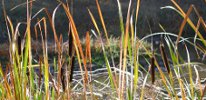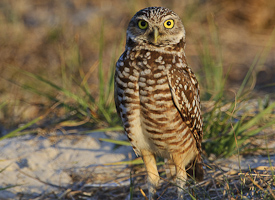
Training
Western Burrowing Owl Workshop 2013-2

On September 5, 2013 Lynne Trulio, Ph.D.l presented a workshop on the biology and conservation of the Burrowing Owl, (Athene cunicularia). Dr. Trulio's research in the South Bay has focused on the ecology and recovery of the Burrowing Owl.
COST: $250.00
Payable by check to Elkhorn Slough Foundation
Payable by credit card (online)
REGISTRATION FOR THIS PROGRAM IS CLOSED
Instructor Information
Dr. Lynne Trulio
Department Chair, Environmental Studies
San Jose State
Contact
Virginia Guhin
virginia@elkhornslough.org
831-274-8700
Sponsors
Description
See also: Burrowing Owl, Maintaining Biodiversity
On September 5, 2013, Lynne Trulio, Ph.D. presented a workshop on the biology and conservation of the Western Burrowing Owl, (Athene cunicularia hypugaea). Dr. Trulio's research in the South San Francisco Bay region has focused on the ecology and recovery of the Burrowing Owl. She has published a variety of papers on the effects of human impact on the species, as well as the general ecology and management for the species.
This was an excellent opportunity to learn about the natural history, habitat needs, effective preservation, and implementation of agency requirements with respect to burrowing owls. Workshop information will be useful for gaining basic knowledge of the species, conservation planning, meeting CEQA and other regulatory requirements, and for outreach to the public.
Workshop Format:
The workshop consiseds of a daytime classroom session, Thursday, September 5, 8:30am-3:00pm and enrollment in one of two field training sessions, either Thursday, September 5, 4:00p.m.-8:00p.m (after the classroom portion) or Friday, September 6, 7:00a.m.-11:00a.m. (field sites tbd).
Workshop Objectives:
- Understanding of the biology of Burrowing Owl
- Understanding of habitat management for this species.
- Understanding of how to apply information in local and large-scale conservation planning efforts.
Topics Discussed:
- Basic biology
- Identification
- Distribution/movement
- Habitat requirements
- Threats
- Survey methods
- Methods for assessing potential project impacts and approaches for avoidance and minimization.
- Management and regulatory requirements
Field training practicum:
Personal vehicles were required for traveling to the sites. The instructor provided information on the ecology and habitat needs of burrowing owls as well as how to plan habitats for owls. In the field, participants:
- surveyed for active burrowing owl burrows and distinguished them from other burrows,
- learned to identify and sex adults in the field,
- identified chicks and their approximate age,
- determined appropriate human disturbance buffer distances, and
- viewed examples of enhancement for burrowing owl nesting and foraging habitat.
***very important***
It is important to note that no component of this workshop should be construed to apply to attendee’s ability to obtain permits related to the Burrowing Owl; if you are interested in how workshop activities might be used for permitting, you are encouraged to contact your agency permitting representative.
Documents and Publications
Contact List
We encourage participants to download the contact list to assist with arranging a rideshare or to get in contact with someone you met at the
workshop. Those interested in sharing a ride to the event are marked on the contact list.
| DOCUMENT | AUTHOR / SOURCE |
|---|---|
| WORKSHOP MATERIALS | |
| Burrowing Owl Bibliography PDF, 372KB |
Lynne Trulio Western Burrowing Owl Workshop 2022 July 2022 |
| PEER-REVIEWED PUBLICATIONS | |
| An analysis of spatial clustering and implications for wildlife management - a burrowing owl example PDF, 163KB |
Fisher, JB, LA Trulio, GS Biging, and D Chromczak Environmental Management 39: 403-411 2007 |
| Assessing changes in the distribution and abundance of burrowing owls in California, 1993-2007 PDF, 11.4MB |
Robert Wilkerson and Rodney Siegel Bird Populations, 10: 1-36 2010 |
| Passive relocation - a method to preserve burrowing owls on disturbed sites PDF, 566KB |
Trulio, LA Journal of Field Ornithology 66(1): 99-106 1995 |
| The diet of western burrowing owls in an urban landscape PDF, 124KB |
Trulio, L and P Higgins Western North American Naturalist 72(3): 348-356 2012 |
| OTHER INFORMATION | |
| Burrowing owl habitat management plan - evaluation of impacts to burrowing owls for the NASA Ames development plan PDF, 3.7MB |
Trulio, L NASA Ames Development Plan 2002 |
| Burrowing owl nesting success in urban and parkland sites in northern California PDF, 358KB |
Trulio, LA and D Chromczak California Burrowing Owl Symposium, 1-15 |
| Burrowing owl survey protocal and mitigation guidelines PDF, 453KB |
The California Burrowing Owl Consortium 1993 |
| Staff Report on Burrowing Owl Mitigation PDF, 116KB |
California Department of Fish and Game 2012 |
| Status assessment and conservation plan for the western burrowing owl in the United States PDF, 908KB |
David S. Klute,
Loren W. Ayers,
Michael T. Green
William H. Howe
Stephanie L. Jones
Jill A. Shaffer
Steven R. Sheffield6,
Tara S. Zimmerman US Fish & Wildlife Service, Biological Technical Publication 2003 |
Links
Directions to Michaels at Shoreline
https://maps.google.com/maps?q=2960+Shoreline+Blvd+94043+(Michaels+at+Shoreline)
Western Burrowing Owl Calls
http://www.allaboutbirds.org/guide/Burrowing_Owl/sounds
Questions and Answers
Submit a question on this subject and we'll provide an answer. coastaltraining@elkhornsloughctp.org
